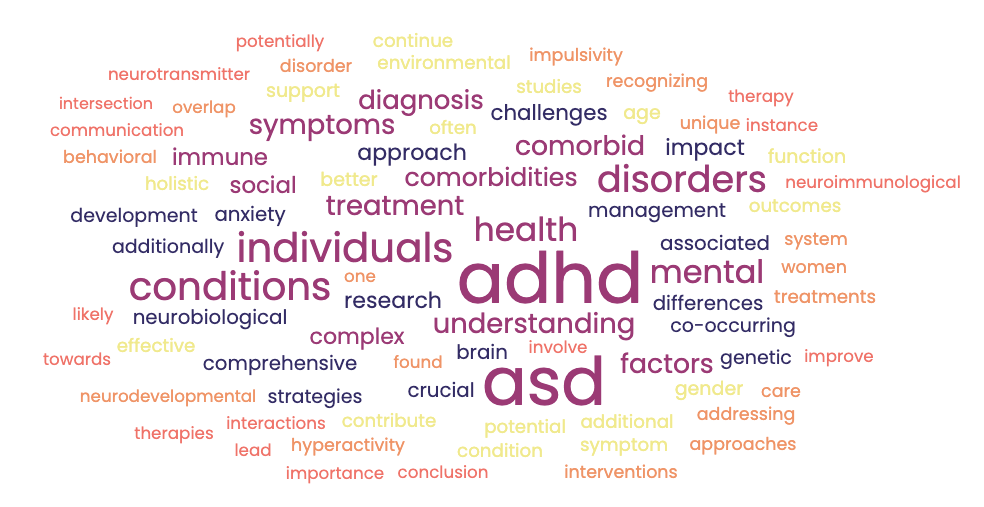In the wake of the COVID-19 pandemic, mental health professionals, parents, and sufferers of ADHD and social anxiety are witnessing a troubling but perhaps not unexpected phenomenon. Studies around the world indicate a marked increase in cases of social anxiety and Attention Deficit Hyperactivity Disorder (ADHD), presenting new challenges for individuals and society at large.
This blog aims to explore the factors contributing to this rise, analyze its impact, and provide practical advice for management and support. Over the course of this conversation, we invite mental health professionals, parents, and those affected to consider the implications and join a community focused on support and strategies for coping in a post-pandemic world.
The Increase in Social Anxiety and ADHD Cases
Recent studies and statistics have revealed a noticeable increase in social anxiety and ADHD diagnoses since the beginning of the COVID-19 pandemic. The long-term effects of extended social isolation, abrupt transitions to remote work and learning, and the pervasive uncertainty have culminated in a perfect storm for exacerbating these conditions.
In particular, young adults and those previously managing their conditions effectively have found themselves battling a resurgence of symptoms or even facing these challenges for the first time. The interruption of daily routines and social structures has left many feeling unmoored, contributing to heightened feelings of anxiety and difficulties with concentration and management of impulses – hallmarks of ADHD.
While the pandemic has certainly disrupted the lives of all individuals, those with social anxiety and ADHD are particularly vulnerable to its effects. We must turn our attention to understanding these challenges and finding ways to support ourselves and others during this unprecedented time.
Understanding the Impact
What makes social anxiety and ADHD difficult conditions to navigate in a post-COVID world? Let’s explore the impact of these conditions and how they may be exacerbated by the current global crisis.
Social Anxiety
Social anxiety is a mental health disorder characterized by intense fear or discomfort in social situations. Those with social anxiety may experience physical symptoms such as sweating, trembling, or blushing when faced with social interactions. This can make everyday activities like going to school, work, or even the grocery store incredibly challenging.
The pandemic has brought about an increased focus on physical health and safety, leading to social distancing measures and restrictions on gatherings. While necessary for public health, these precautions have also resulted in a decrease in face-to-face interactions and an increase in virtual communication. For individuals with social anxiety, this can be isolating and heighten feelings of discomfort when faced with the prospect of in-person interactions.
ADHD
ADHD is a neurodevelopmental disorder characterized by difficulty with attention, hyperactivity, and impulsivity. Those with ADHD may struggle to focus on tasks or follow through on plans, leading to challenges in academic, professional, and personal settings.
The sudden shift to remote learning and working has disrupted established routines and structures, making it even more challenging for individuals with ADHD to manage their symptoms. The lack of in-person support and structure may also contribute to overwhelming feelings and difficulty managing impulses.
Impact of Social Distancing and Isolation
The necessary public health response to control the spread of COVID-19, particularly measures involving social distancing and isolation, has taken a toll on mental health. In battling a viral contagion, we inadvertently created conditions ripe for a mental health contagion.
For individuals predisposed to social anxiety, the enforced separation from social contexts has paradoxically increased the distress associated with social situations. Meanwhile, those with ADHD have struggled with the lack of structure and environmental change that remote working and virtual learning environments have wrought. Disruptions to normal supportive interactions have also meant less reinforcement of positive coping strategies.
Navigating the Post-Pandemic Landscape
As we move into a new phase of living with the presence of COVID-19, it is critical that we equip ourselves with strategies and coping mechanisms to manage social anxiety and ADHD symptoms. Building back a sense of routine and predictability can be enormously stabilizing for those with ADHD. Simultaneously, for those facing social anxiety, gradual re-exposure to social settings – coupled with compassionate self-talk and realistic expectations – can ease the transition out of isolation.
Moreover, the importance of a robust support network cannot be overstated. Sharing experiences and strategies within a community setting can offer comfort and practical help. For those more severely affected, professional guidance from mental health practitioners remains an essential component of managing these conditions.
The Dual Role of Technology
Throughout the pandemic, technology has been a double-edged sword. On one hand, it’s been a lifeline – allowing for continuity of work, education, and even socialization. On the other, it’s also served as a catalyst for anxiety and ADHD. The relentless pace of digital communication and the screen-based lifestyle can exacerbate symptoms of both conditions.
Our challenge now is to strike a balance, leveraging technology as a tool for connection and support rather than a source of overwhelm. Digital detoxes, mindfulness practices, and conscious consumption of media can all play a part in mitigating the negative impact of our screen-saturated lives.
The pervasive influence of technology, notably through social media platforms, has played a significant role in shaping the landscape of social anxiety and ADHD in the post-pandemic era. For individuals with social anxiety, the constant barrage of curated lives and success stories can exacerbate feelings of inadequacy and isolation. The pressure to maintain an online persona that aligns with societal expectations can lead to increased social withdrawal and anxiety in real-life interactions.
On the ADHD front, the hyper-stimulating environment of endless notifications, multitasking demands, and rapid-fire information exchange can be particularly detrimental. This digital ecosystem often mirrors and magnifies the internal experience of ADHD, making focus and impulse control even more challenging. The resultant difficulty in disengaging from digital platforms can disrupt sleep patterns, reduce physical activity, and impair social skills development, further complicating ADHD management strategies.
Thus, as we grapple with the consequences of our increasingly digital lives, understanding the nuanced impact of technology on mental health conditions like social anxiety and ADHD becomes crucial. Developing mindful technology use practices and promoting digital literacy that acknowledges these challenges can help mitigate their adverse effects, paving the way for more balanced and healthy interactions with our digital world.
The Importance of Early Detection and Intervention
Identifying social anxiety and ADHD early and initiating appropriate interventions can significantly improve long-term outcomes. Teachers, parents, and individuals themselves should be aware of the signs and symptoms of these conditions and not dismiss them as merely “post-pandemic jitters.”
Professionals can aid in screening for these issues and directing individuals toward resources, therapy options, and support groups. There is a plethora of information online, telehealth services, and in-person support available to help those adjusting to this new normal. It is essential to seek help and not let these conditions go unaddressed, as they can have lasting effects on mental health and overall well-being.
In conclusion, the COVID-19 pandemic has had a profound impact on individuals with social anxiety and ADHD. As we navigate the post-pandemic landscape, it is crucial to prioritize mental health and build resilience against these conditions. By promoting understanding, implementing effective coping strategies, and seeking early intervention when needed, we can mitigate the negative effects of social distancing and isolation on mental health and foster a more mentally healthy society.
Coping and Management Strategies
So, where do we go from here? In this new reality post-COVID, individuals with social anxiety and ADHD may need to develop or re-commit to coping strategies. Mental health professionals can assist in tailoring these strategies and counseling on how to incorporate them into daily routines for maximum benefit.
For those managing ADHD, sticking to a regular schedule and incorporating physical activity can help mitigate symptoms. Additionally, maintaining connections with supportive networks and seeking professional counsel where necessary can provide valuable support.
For individuals with social anxiety, gradually reintroducing social interactions in safe settings, practicing relaxation techniques to manage physical manifestations of anxiety, and engaging in activities that bring joy and fulfillment can help combat feelings of isolation and distress.
Here are a few suggestions for managing social anxiety and ADHD in a post-COVID world:
- Practice self-care: Prioritize activities that promote physical, emotional, and mental well-being. This may include exercise, mindfulness practices, or engaging in hobbies that bring joy and relaxation.
- Stay connected: While in-person interactions may be limited, it’s important to maintain social connections through virtual means. Schedule regular check-ins with friends and loved ones, or join online support groups for individuals with social anxiety or ADHD.
- Establish routines: With the disruption of daily routines, it can be helpful to establish new structures and schedules to promote a sense of stability. This may include setting specific times for work, breaks, and leisure activities.
- Seek therapy: Consider seeking professional support from a therapist who specializes in social anxiety or ADHD. They can provide valuable tools and techniques for managing symptoms and navigating the challenges of the pandemic.
Conclusion
While the COVID-19 pandemic continues to present challenges to our collective well-being, understanding the secondary effects on mental health, particularly the increase in social anxiety and ADHD, is critical. Acknowledging the breadth of these impacts enables us to confront them more directly and compassionately.
Together, we must foster environments that are inclusive, understanding, and supportive – whether in homes, workplaces, schools, or broader communities. The turbulent times of the pandemic present us with a unique opportunity to reshape attitudes around mental health, ensuring those who battle social anxiety and ADHD do not do so in the shadows.
For those who resonate with these challenges, know that you are not alone. Your experiences are valid, and help is at hand. Join our community for support and strategies, and take meaningful steps towards recovery and resilience in the post-COVID era. Your well-being matters, and together, we can emerge stronger.







